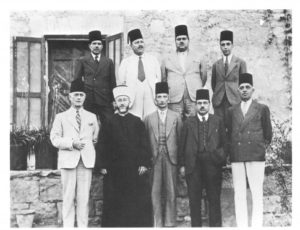U.N. Is Asked to Provide Palestine Police, Associated Press, San Francisco Chronicle, Jan. 15, 1948.
 Click here to view the original newspaper article.
Click here to view the original newspaper article.
LAKE SUCCESS, Jan. 15 (U.P.)—A resolution calling on the United Nations Security Council to consider formation of an international police force for Palestine was presented to the U. N. Palestine Commission today by Senator Vincente J. Francisco of the Philippines.
U. N. officials said the resolution had been submitted to the secretary of the commission.
Francisco’s resolution reportedly called on the Security Council to determine whether there is a breach of the peace or threat to the peace in Palestine and, if so, to take steps toward organizing an international police force to handle partitioning of the Holy Land into Jewish and Arab states.
(The Associated Press reported Moshe Shertok, representative of the Jewish Agency for Palestine, appeared before the committee and said the Jewish Agency felt immediate action should be taken to create the international force for the Holy Land and to assist in establishing a Jewish militia.)
The commission today discussed the statement made yesterday by Sir Alexander Cadogan, British delegate to the U. N., which reaffirmed Britain’s decision to lay down the Palestine mandate May 15 or earlier.
The commission considered the first draft of a series of questions to be presented to Cadogan and decided how many of the questions had been answered, at least in part, by his statement yesterday.
First on the list of questions, according to a U. N. press officer, was an outline of British policy on Jewish immigration into Palestine between now and the termination of the mandate.
In a cloak-and-dagger atmosphere, the timetable was shown to the U. N. Palestine Commission and 10 carefully screened U. N. Secretariat officials late yesterday by British Delegate Sir Alexander Cadogan.
All present at the meeting have been sworn to secrecy about the dates on which British troops now totaling 75,000, will be withdrawn under partition of the Holy Land into Arab and Jewish states.
Both British officials and U. N. diplomats reportedly felt disclosure of the dates to Arabs or Jews would heighten danger and bloodshed in Palestine by giving advance notice of places open to attack.
(According to the Chicago Daily News Foreign Service, Cadogan’s statement had these four main points-
(1—He reaffirmed the British intention to evacuate all of Palestine by August 1.
(2—He said Britain plans, as announced, to lay down its mandate by May 15 or earlier. But he was not able, now, to say if an earlier date were possible.
(3—The British government feels there should be an overlap in the arrival of the U. N. commission and the ending of the mandate—“perhaps a fortnight.”
(This is a slight change in the earlier British refusal to permit the U. N. into Palestine during the life of the mandate.
(4—The British may feel inclined to make a seaport available to the Zionists by February 1, the date specified in the U. N. General Assembly’s resolution, but this, he was quick to emphasize, requires further discussion.
(His tone, however, seemed to imply that the deadline would be met.)
The British delegate offered each commission member a copy of the timetable. Each refused to take one, just as each had decided not to take any notes while Cadogan spoke.
It was decided to accept only one copy of the timetable to minimize chances of a leak. The copy was locked in a briefcase and quickly put into a strongbox.



